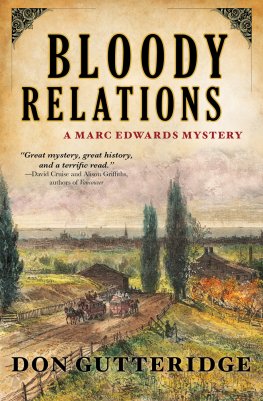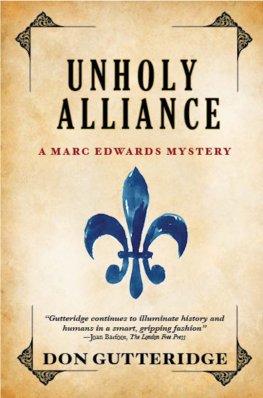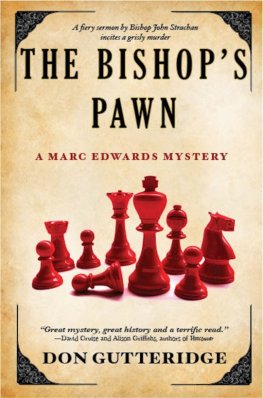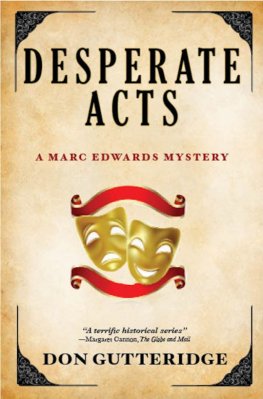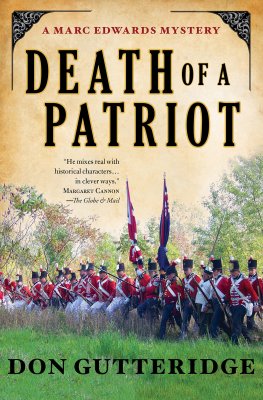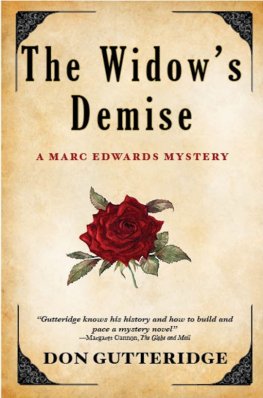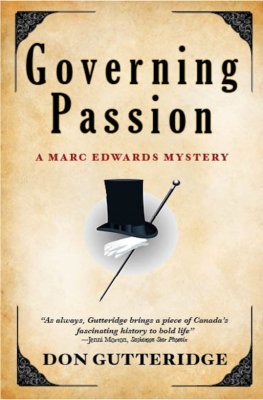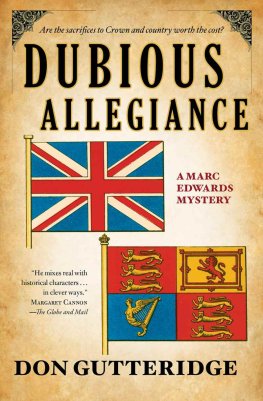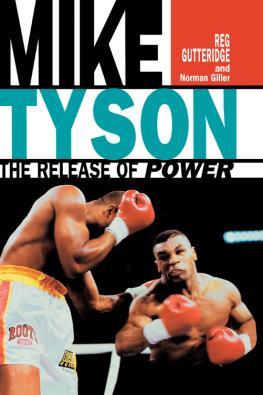Don Gutteridge - Bloody Relations
Here you can read online Don Gutteridge - Bloody Relations full text of the book (entire story) in english for free. Download pdf and epub, get meaning, cover and reviews about this ebook. year: 0101, publisher: Touchstone, genre: Detective and thriller. Description of the work, (preface) as well as reviews are available. Best literature library LitArk.com created for fans of good reading and offers a wide selection of genres:
Romance novel
Science fiction
Adventure
Detective
Science
History
Home and family
Prose
Art
Politics
Computer
Non-fiction
Religion
Business
Children
Humor
Choose a favorite category and find really read worthwhile books. Enjoy immersion in the world of imagination, feel the emotions of the characters or learn something new for yourself, make an fascinating discovery.
- Book:Bloody Relations
- Author:
- Publisher:Touchstone
- Genre:
- Year:0101
- Rating:5 / 5
- Favourites:Add to favourites
- Your mark:
- 100
- 1
- 2
- 3
- 4
- 5
Bloody Relations: summary, description and annotation
We offer to read an annotation, description, summary or preface (depends on what the author of the book "Bloody Relations" wrote himself). If you haven't found the necessary information about the book — write in the comments, we will try to find it.
Bloody Relations — read online for free the complete book (whole text) full work
Below is the text of the book, divided by pages. System saving the place of the last page read, allows you to conveniently read the book "Bloody Relations" online for free, without having to search again every time where you left off. Put a bookmark, and you can go to the page where you finished reading at any time.
Font size:
Interval:
Bookmark:
Don Gutteridge
Bloody Relations
PROLOGUE
It is July 1838. The provinces of Upper and Lower Canada have suffered through two rebellions, both summarily put down. Although there is peace, it is an uneasy calm that hangs over both colonies. The grievances that fomented revolt remain unresolved, principally the oppression of the mass of farmers at the hands of legislatures that are tipped in favour of the established order. For more than a decade, reform movements in both provinces have tried unsuccessfully to introduce more democratic, less authoritarian forms of governance. The mother country has at last woken up to the issues and is taking steps to alleviate the situation. A new governor, Sir George Arthur, is appointed for Upper Canada, replacing Sir Francis Bond Head. More important, Lord Durham, a Whig sympathizer, is named head of a commission of inquiry and temporary governor of both colonies, tasked with finding a possible solution for the troubled provinces. In July of 1838, he visits Quebec City, Montreal, Niagara, and finally Toronto, consulting with dozens of locals from every level of society. Months later he will make a report that will forever alter the nature of the Canadas.
ONE
Briar Cottage
11 Sherbourne Street
Toronto, Upper Canada
July 17, 1838
Dear Uncle Frederick:
I was happy to hear that youve almost wound up Uncle Jabezs affairs and the settling of his estate. No doubt you are looking forward to your return to France and the bosom of your family. That they are all healthy and thriving must provide you with some consolation during this period of mourning for your brother.
As you know from my previous letters, a number of which likely arrived simultaneously in April-the mails here are as unreliable as the roads-my life since last October when the troubles began has been both hectic and harrowing. Thus it is only in the past two months, since my marriage to Beth, that I have had time to reflect on what now seems my other life in England and the role that Uncle Jabez played in it. I miss him more each day, and have long ago forgiven him for his faults, as he was kind enough to overlook or indulge mine. His generous annuity on my behalf is more than I deserve. I wish to thank you for arranging its transfer to my bank here in Toronto. As you know, Beth inherited money and property from Joshua Smallman, her father-in-law, so we are well situated financially.
That being so, you may wonder at our purchasing a cottage here in town rather than a residence, or even having one built to our specifications and fancy. In fact, Briar Cottage suits us both just fine. For the moment there is only Beth, me, and Charlene Huggan, a young woman whose sisters have gone off to homestead in the Iowa Territory. Charlene is our housekeeper (the local term for an all-purpose female servant). Should our mnage expand, as I devoutly hope it will, we shall add additional rooms on the back of the house. We have better than half an acre of land, minuscule by the standards of the English gentry, but that is sufficient for a considerable vegetable garden and a coop full of chickens. There is a small barn as well, which will shelter a carriage horse before summer.
You will be surprised to hear that Beth looks after the garden herself (she ran a farm on her own after her first husband died), with occasional assistance from a hired man (another localism) and her own husband. The latter, however, has been branded hopeless by his employer, who seems at a loss to explain how he could wield a sabre and dodge bullets (well, most of them) and yet be utterly inept with sickle and hoe.
You asked again about my war wound, and I am pleased to report that I have fully recovered. My stamina and physical strength are returned to their former glory and my limp is slight and barely noticeable. (It seems to worsen only when I am in need of an infusion of sympathy.) And thanks to the law books you were so thoughtful as to send, I have been exercising my mind once more. As you know only too well, I abandoned the solicitors inns for the life of a soldier with your timely assistance, and have never regretted doing so even though, for reasons I outlined in my last letter, I felt compelled to resign my commission. A life of petty, if profitable, conveyancing was not for me. However, the notion of becoming a barrister someday has its attractions. At any rate, the thought of such a career and the necessity of burrowing deep into the tomes of jurisprudence are enough to keep me out of trouble for the time being.
It is mid-afternoon on a July Monday as I write this. Just a few hours ago, one of the more memorable and happy events of the year took place, and I am eager to describe it to you while it is fresh in my mind. Down at the Queens Wharf this morning, more than a thousand citizens of every political stripe gathered to witness the arrival, from his stopover in Niagara, of Lord Durham, governor of all the British North American provinces, special envoy of Prime Minister Melbourne, and the man chosen by the Whig government to broker a lasting peace among the warring factions of Upper and Lower Canada.
The pomp and panoply were worthy of a monarchs progress through his dominions. I have seen nothing more splendid or exquisitely intimidating at Hyde Park or more festive and convivial at Brighton racecourse! In front of the early-morning crowd at the wharf and behind them on the open ground above Front Street were arranged the colourful ranks of the Kings Dragoon Guards and the 43rd Foot (force-marched up from Fort George at Niagara) as well as our own 23rd from Fort York. The immaculate tents of the dragoons, who had bivouacked along the bay and the spit to the west, fluttered in an approving breeze.
Then, about ten oclock, a blast of trumpets behind us proclaimed the sighting of sails beyond the southeast shore of the peninsula-cum-island that acts as a buffer for our beautiful bay. A huge hurrah went up. Even our most skeptical Tories are overawed by the divinity that doth hedge someone whos hobnobbed with kings and czars. The schooner ferrying His Lordship then weighed anchor some leagues offshore. After an agonizing and well-judged pause, a longboat was lowered, soon to be joined by others from ships we couldnt quite see, and the flash of oars in perfect unison left the throng momentarily stunned. They spoke to us humbled onlookers of the might and relentless precision of the British Empire.
As the band struck up a martial air behind us, the longboats came silently and with deliberate ease towards the end of the wharf, where an honour guard flanked Lieutenant-Governor Sir George Arthur and his liveried minions. When the leading longboat drew near, the oars flipped up as one and stilled. In the middle of the boat, a tall and majestic figure rose gracefully into view and posed for posterity. Neither it nor the impeccably dressed oarsmen moved again as the demi-royal craft floated on its own glamour towards the tip of the quay and, while the crowd held its breath, nudged the pier as softly and meticulously as a caress. Then the air reverberated with the thunder of a twenty-one-gun salute, during which Lord Durham put first one foot then the other upon Toronto soil, before extending a hand to Lady Durham and drawing her up beside him. I thought of Caesar putting a Roman toe upon the simple shingle of ancient Britain.
The effect of this gesture upon the Upper Canadian populace was, I am certain, a calculated one. Lord Durham-the man you know as Radical Jack at home-is in the eyes of the Tory Compact here a thoroughgoing Whig. They know about, and are appalled by, his coddling of the miners who toil for him in Durham, his permitting them to form workers associations, and his dastardly role in designing and carrying through the Great Reform Bill six years ago. They also keenly disapprove of his dismissal of the Tory Council in Quebec, his lenient treatment of the French rebels, and his even-handed attempts to sort out the various claims of grievance. Hence His Lordship seems to realize that a little pomp and ceremony and a reminder that he is after all a peer and a member of the real Privy Council will go some way towards cowing the local gentry and petty aristocracy. Indeed, the first affair of state will not take place at Government House but rather at one of our native palaces, Spadina House. Nor will it be a business meeting. At nine this evening, Lord and Lady Durham will play host to the towns elite at the Governors Ball-gourmandizing and dancing till the wee hours! More on this in the next letter. Till then, I remain,
Font size:
Interval:
Bookmark:
Similar books «Bloody Relations»
Look at similar books to Bloody Relations. We have selected literature similar in name and meaning in the hope of providing readers with more options to find new, interesting, not yet read works.
Discussion, reviews of the book Bloody Relations and just readers' own opinions. Leave your comments, write what you think about the work, its meaning or the main characters. Specify what exactly you liked and what you didn't like, and why you think so.

